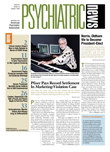Although adult arsonists can cause a devastating loss in property and lives, very little is known about them.
However, the 2001-2002 National Epidemiologic Survey on Alcohol and Related Conditions, a nationally representative sample of some 43,000 Americans aged 18 or older, gave some scientists an unprecedented opportunity to learn more about adult arsonists because one of the many questions asked of those surveyed was the following: “In your entire life, did you ever start a fire on purpose to destroy someone else's property or just to see it burn?”
Out of the approximately 43,000 survey respondents, some 400 individuals answered yes to this question, the scientists reported online July 10 in Comprehensive Psychiatry. Thus, extrapolating from this finding, it looks as if arsonists constitute 1 percent of the U.S. population.
Moreover, by comparing survey responses from the individuals who reported having intentionally started fires with those from the individuals who had not, the scientists were able to glean some valuable insights into adult arsonists.
•
They tend to be male, white, 18 to 35 years old, and living in the West of the United States, but not of any particular income, educational level, or marital status.
•
“One of the more surprising results demographically was that [U.S.-born] Americans are approximately two and a half times more likely than foreign-born Americans to set fires,” the lead investigator, Michael Vaughn, Ph.D., told Psychiatric News. Vaughn is an assistant professor in St. Louis University's Department of Public Policy Studies.
•
Arsonists are 12 times more likely to have antisocial personality disorder than are people who do not set fires. They tend to engage not only in fire setting but in a wide swath of other antisocial behaviors, such as assault, robbery, rape, weapon use, and cruelty to animals. They often come from antisocial families. They often have obsessive-compulsive personality disorder, alcohol use disorder, and/or marijuana use disorder.
“I expect the study findings will be of interest not only to the psychiatric community, but also to insurance-company personnel, municipal firefighters, and other entities affected by the serious costs associated with arson,” Vaughn noted. For instance, their findings might help the police better profile arsonists. Also, “Given the substantial personal and social costs related to arson, prevention and treatment interventions targeting fire setters potentially could save lives and property,” Vaughn and his colleagues wrote.
The study was funded by the National Institutes of Health.
An abstract of “Prevalence and Correlates of Fire Setting in the United States: Results From the National Epidemiological Survey on Alcohol and Related Conditions” can be accessed at<www.sciencedirect.com> under “Browse by Title,” “C,” and then“ Comprehensive Psychiatry Articles in Press.” ▪
